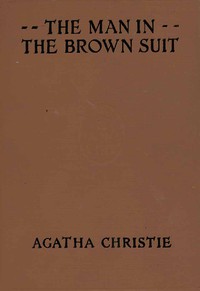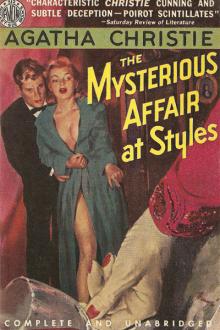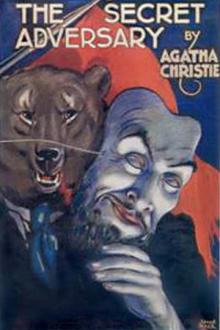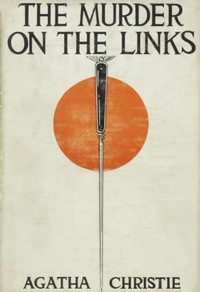The Man in the Brown Suit by Agatha Christie (ebook reader browser .TXT) 📗

- Author: Agatha Christie
Book online «The Man in the Brown Suit by Agatha Christie (ebook reader browser .TXT) 📗». Author Agatha Christie
I paused for breath.
“You misunderstand me. It was of your other secretary that I spoke.”
“What? Pagett?” I cried, in lively astonishment. “He’s been with me eight years—a most trustworthy fellow.”
My interlocutor smiled.
“We are still at cross-purposes. I refer to the lady.”
“Miss Pettigrew?” I exclaimed.
“Yes. She has been seen coming out of Agrasato’s Native Curio-shop.”
“God bless my soul!” I interrupted. “I was going into that place myself this afternoon. You might have caught me coming out!”
There doesn’t seem to be any innocent thing that one can do in Jo’burg without being suspected for it.
“Ah! but she has been there more than once—and in rather doubtful circumstances. I may as well tell you—in confidence, Sir Eustace—that the place is suspected of being a well-known rendezvous used by the secret organization behind this revolution. That is why I should be glad to hear all that you can tell me about this lady. Where and how did you come to engage her?”
“She was lent to me,” I replied coldly, “by your own Government.”
He collapsed utterly.
As soon as I got to Kimberley I wired to Suzanne.
She joined me there with the utmost dispatch, heralding her arrival with telegrams sent off en route. I was awfully surprised to find that she really was fond of me—I thought I had been just a new sensation, but she positively fell on my neck and wept when we met.
When we had recovered from our emotion a little, I sat down on the bed and told her the whole story from A to Z.
“You always did suspect Colonel Race,” she said thoughtfully, when I had finished. “I didn’t until the night you disappeared. I liked him so much all along and thought he would make such a nice husband for you. Oh, Anne, dear, don’t be cross, but how do you know that this young man of yours is telling the truth? You believe every word he says.”
“Of course I do,” I cried indignantly.
“But what is there in him that attracts you so? I don’t see that there’s anything in him at all except his rather reckless good looks and his modern Sheik-cum-Stone-Age love-making.”
I poured out the vials of my wrath upon Suzanne for some minutes.
“Just because you’re comfortably married and getting fat, you’ve forgotten that there’s any such thing as romance,” I ended.
“Oh, I’m not getting fat, Anne. All the worry I’ve had about you lately must have worn me to a shred.”
“You look particularly well nourished,” I said coldly. “I should say you must have put on about half a stone.”
“And I don’t know that I’m so comfortably married either,” continued Suzanne in a melancholy voice. “I’ve been having the most dreadful cables from Clarence ordering me to come home at once. At last I didn’t answer them, and now I haven’t heard for over a fortnight.”
I’m afraid I didn’t take Suzanne’s matrimonial troubles very seriously. She will be able to get round Clarence all right when the times comes. I turned the conversation to the subject of the diamonds.
Suzanne looked at me with a dropped jaw.
“I must explain, Anne. You see, as soon as I began to suspect Colonel Race, I was terribly upset about the diamonds. I wanted to stay on at the Falls in case he might have kidnapped you somewhere close by, but didn’t know what to do about the diamonds. I was afraid to keep them in my possession——”
Suzanne looked round her uneasily, as though she feared the walls might have ears, and then whispered vehemently in my ear.
“A distinctly good idea,” I approved. “At the time, that is. It’s a bit awkward now. What did Sir Eustace do with the cases?”
“The big ones were sent down to Cape Town. I heard from Pagett before I left the Falls, and he enclosed the receipt for their storage. He’s leaving Cape Town to-day, by the by, to join Sir Eustace in Johannesburg.”
“I see,” I said thoughtfully. “And the small ones, where are they?”
“I suppose Sir Eustace has got them with him.”
I turned the matter over in my mind.
“Well,” I said at last, “it’s awkward—but it’s safe enough. We’d better do nothing for the present.”
Suzanne looked at me with a little smile.
“You don’t like doing nothing, do you, Anne?”
“Not very much,” I replied honestly.
The one thing I could do was to get hold of a time-table and see what time Guy Pagett’s train would pass through Kimberley. I found that it would arrive at 5.40 on the following afternoon and depart again at 6. I wanted to see Pagett as soon as possible, and that seemed to me a good opportunity. The situation on the Rand was getting very serious, and it might be a long time before I got another chance.
The only thing that livened up the day was a wire dispatched from Johannesburg. A most innocent-sounding telegram:
“Arrived safely. All going well. Eric here, also Eustace, but not Guy. Remain where you are for the present. Andy.”
Eric was our pseudonym for Race. I chose it because it is a name I dislike exceedingly. There was clearly nothing to be done until I could see Pagett. Suzanne employed herself in sending off a long soothing cable to the far-off Clarence. She became quite sentimental over him. In her way—which of course is quite different from me and Harry—she is really fond of Clarence.
“I do wish he was here, Anne,” she gulped. “It’s such a long time since I’ve seen him.”
“Have some face cream,” I said soothingly.
Suzanne rubbed a little on the tip of her charming nose.
“I shall want some more face cream soon too,” she remarked, “and you can only get this kind in Paris.” She sighed. “Paris!”
“Suzanne,” I said, “very soon you’ll have had enough of South Africa and adventure.”
“I should like a really nice hat,” admitted Suzanne wistfully. “Shall I come with you to meet Guy Pagett to-morrow?”
“I prefer to go alone. He’d be shyer speaking before two of us.”
So it came about that I was standing in the doorway of the hotel on the following afternoon, struggling with a recalcitrant parasol that refused to go up, whilst Suzanne lay peacefully on her bed with a book and a basket of fruit.
According to the hotel porter, the train was on its good behaviour to-day and would be almost on time, though he was extremely doubtful whether it would ever get through to Johannesburg. The line had been blown up, so he solemnly assured me. It sounded cheerful!
The train drew in just ten minutes late. Everybody tumbled out on the platform and began walking up and down feverishly. I had no difficulty in espying Pagett. I accosted him eagerly. He gave his usual nervous start at seeing me—somewhat accentuated this time.
“Dear me, Miss Beddingfeld, I understood that you had disappeared.”
“I have reappeared again,” I told him solemnly. “And how are you, Mr. Pagett?”
“Very well, thank you—looking forward to taking up my work again with Sir Eustace.”
“Mr. Pagett,” I said, “there is something I want to ask you. I hope that you won’t be offended, but a lot hangs on it, more than you can possibly guess. I want to know what you were doing at Marlow on the 8th of January last?”
He started violently.
“Really, Miss Beddingfeld—I—indeed——”
“You were there, weren’t you?”
“I—for reasons of my own I was in the neighbourhood, yes.”
“Won’t you tell me what those reasons were?”
“Sir Eustace has not already told you?”
“Sir Eustace? Does he know?”
“I am almost sure that he does. I hoped he had not recognized me, but from the hints he has let drop, and his remarks, I fear it is only too certain. In any case, I meant to make a clean breast of the matter and offer him my resignation. He is a peculiar man, Miss Beddingfeld, with an abnormal sense of humour. It seems to amuse him to keep me on tenter-hooks. All the time, I dare say, he was perfectly well aware of the true facts. Possibly he has known them for years.”
I hoped that sooner or later I should be able to understand what Pagett was talking about. He went on fluently:
“It is difficult for a man of Sir Eustace’s standing to put himself in my position. I know that I was in the wrong, but it seemed a harmless deception. I would have thought it better taste on his part to have tackled me outright—instead of indulging in covert jokes at my expense.”
A whistle blew, and the people began to surge back into the train.
“Yes, Mr. Pagett,” I broke in, “I’m sure I quite agree with all you’re saying about Sir Eustace. But why did you go to Marlow?”
“It was wrong of me, but natural under the circumstances—yes, I still feel natural under the circumstances.”
“What circumstances?” I cried desperately.
For the first time Pagett seemed to recognize that I was asking him a question. His mind detached itself from the peculiarities of Sir Eustace and his own justification and came to rest on me.
“I beg your pardon, Miss Beddingfeld,” he said stiffly, “but I fail to see your concern in the matter.”
He was back in the train now, leaning down to speak to me. I felt desperate. What could one do with a man like that?
“Of course, if it’s so dreadful that you’d be ashamed to speak of it to me——” I began spitefully.
At last I had found the right stop. Pagett stiffened and flushed.
“Dreadful? Ashamed? I don’t understand you.”
“Then tell me.”
In three short sentences he told me. At last I knew Pagett’s secret! It was not in the least what I expected.
I walked slowly back to the hotel. There a wire was handed to me. I tore it open. It contained full and definite instructions for me to proceed forthwith to Johannesburg, or rather to a station this side of Johannesburg, where I should be met by a car. It was signed, not Andy, but Harry.
I sat down in a chair to do some very serious thinking.
Pagett has arrived. He is in a blue funk of course. Suggested at once that we should go off to Pretoria. Then, when I had told him kindly but firmly that we were going to remain here, he went to the other extreme, wished he had his rifle here, and began bucking about some bridge he guarded during the Great War. A railway bridge at Little Puddecombe junction, or something of that sort.
I soon cut that short by telling him to unpack the big typewriter. I thought that that would keep him employed for some time, because the typewriter was sure to have gone wrong—it always does—and he would have to take it somewhere to be mended. But I had forgotten Pagett’s powers of being in the right.
“I’ve already unpacked all the cases, Sir Eustace. The typewriter is in perfect condition.”
“What do you mean—all the cases?”
“The two small cases as well.”
“I wish you wouldn’t be so officious, Pagett. Those small cases were no business of yours. They belong to Mrs. Blair.”
Pagett looked crestfallen. He hates to make a mistake.
“So you can just pack them up again neatly,” I continued. “After that you can go out and look around you. Jo’burg will probably be a heap of smoking ruins by to-morrow, so it may be your last chance.”
I thought that that would get rid of him successfully for the morning, at any rate.
“There is something I want to say to you when you have the leisure, Sir Eustace.”
“I haven’t got it now,” I said hastily. “At this minute I have absolutely no leisure whatsoever.”
Pagett retired.
“By the way,” I called after him, “what was there in those cases of Mrs. Blair’s?”
“Some fur rugs, and a couple of fur—hats, I think.”
“That’s right,” I assented. “She bought them on the train. They are hats—of a kind—though I hardly wonder at your not recognizing them. I dare say she’s going to wear one of them at Ascot. What else was there?”
“Some rolls of films and some baskets—a lot of baskets——”
“There would be,” I assured him. “Mrs. Blair is the kind of woman who never buys less than a dozen or so of anything.”
“I think that’s all, Sir Eustace, except some miscellaneous odds and ends, a motor-veil and some odd gloves—that sort of thing.”
“If you hadn’t been a born idiot, Pagett, you would have seen from the start that those couldn’t possibly be my belongings.”
“I thought some of them might belong to Miss Pettigrew.”
“Ah, that reminds me—what do you mean by





Comments (0)